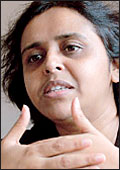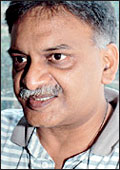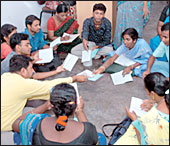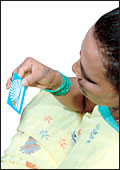 |
| On track: A sex worker hits the streets
of Mysore, but for a vastly different reason this time around
|
MYSORE,
KARNATAKA
Wednesday, May 31, 2006
Hidden
behind a noisy auto stand and flanked by an assortment of petty
stores, the office of Karnataka Health Promotion Trust (KHPT)
doesn't seem like a place where one might find innovative solutions
to one of India's most pressing problems: The HIV epidemic. Yet,
up a narrow flight of stairs on the first floor of an unremarkable
white building, Susheena RezaPaul and her team have come up with
a quiet, yet path-breaking, answer to the human immuno deficiency
virus (HIV) scourge. As the Director of KHPT, a joint venture
between Bill & Melinda Gates Foundation's Avahan and Canada's
University of Manitoba, RezaPaul is leading a novel initiative
to keep tabs on the health of the most HIV-prone segment of our
population: Sex workers.
On May 26 this year, KHPT distributed smart
cards to 500 sex workers spread across Mysore and nearby Mandya
in a pilot project intended to better understand their lives.
RezaPaul, a physician by training, says these cards will act as
loyalty cards with a select group of five stores frequented by
sex workers for items such as food, clothing and, most importantly,
medicines and condoms. Purchases are logged using a Simputer handheld
computer and the reward points on purchases can be redeemed on
subsequent visits.
 |
 |
"The
use of smart cards has given the sex workers a sense of pride
and belonging"
DR SUSHEENA REZAPAUL
Director/KHPT |
"We
need a more structured fight against this illness, since it
is looked on as something that can be managed"
DR SUNDAR SUNDARAMAN
Advisor/ Bill & Melinda
Gates Foundation |
The real benefit of the smart card is, however,
much bigger. The smart cards issued to these sex workers are valid
for just three months. To renew it, the card holder must visit
a health centre, where she can also get a medical check up. In
other words, the smart cards are being used to keep track of a
dynamic, HIV-prone population. Explains RezaPaul: "Prostitution
in Mysore is not organised like the brothels of Sona Gachi in
Kolkata (the red light district houses 60,000 to 70,000 sex workers)
and they work primarily by soliciting on the city streets and
then in city lodges."
Before zeroing in on smart cards, KHPT tried
using ordinary cards with a special id number. But the experiment
failed because most of the sex workers were illiterate, besides
which, KHPT discovered, many of them had the same name (there
are dozens of Ratnas, for instance) and that led to problems in
tracking their individual health and follow-ups. The use of smart
cards, says RezaPaul, has given the sex workers a sense of pride
and belonging. "It's about creating a place where they feel
welcome and uninhibited," she says, as we walk around a vast
recreation room, where sex workers catch up on gossip, eat lunch
and catch a quick nap before hitting the streets once more.
 |
| Team talk: Representatives of Ashodaya,
an association of sex workers, regularly meets to discuss
issues |
Having got a taste of the smart technology,
Mysore's sex workers want more from it. "We make about Rs
500 a day and need more features to be added to the card if it
is to be effective," says Ratnamma, a sex worker of 10 years
and President of Ashodaya, a community body. (Ashodaya, which
means a ray of light in English, has given the sex workers voice
against low-level policemen and anti-socials, besides certain
minimum working conditions. Members, for example, are required
to insist on use of condoms by customers and report any cases
of child trafficking to a 10-person supervisory board.) In response
to such demands, KHPT is considering integrating an ATM option
with the card so that the users can immediately deposit their
earnings before they are hassled by cops and/or the local toughs.
 |
| Help at hand: A sex worker in Mysore
with the smart card |
With just five vendors aboard at the moment
and the initiative only a few days old, much more needs to be
done before this smart card solution can be rolled out statewide.
"We are yet to finalise which shops we need to focus on and
what goods sex workers find most essential. We also need to consider
if requirements vary for, say, those operating in Bangalore compared
to Mysore," says RezaPaul. Despite these chinks, administrators
and advocates remain confident that this initiative can be scaled
up to, one day, reach all of the two million sex workers across
the country. "The various components of the fight against
aids are disjointed in India and across the globe. We need a more
structured fight against this illness, since it is increasingly
looked upon as something that can be managed," says Sundar
Sundaraman, an advisor to the Bill & Melinda Gates Foundation
in India.
Mysore's smart card experiment, then, looks
like a good beginning.
|








